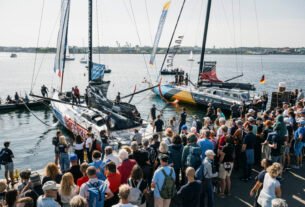Tuesday’s practice race counted for nothing, at least not when it came to points.
The simple out and return course to a mark near La Isla de Tabarca was billed as a practice race for both the teams and the organisers while providing spectators and guests a taste of what’s in store ahead of the race start at the weekend.
As 11th Hour Racing Team’s skipper Charlie Enright – returning from COVID protocol – briefed the crew aboard their IMOCA Malama he emphasised the need to keep things simple and avoid damaging the boat. Today was not the day to push hard. Instead, Friday’s ProAm race, 48 hours ahead of the race proper would be the time focus on increasing the pace. This would be the time to ramp up the intensity.
Everyone nodded in agreement.
But, as the seconds counted down towards the start of our non-scoring practice race, the intense physical activity below decks and the quickfire tactical conversations seemed to contrast with what had been said at the briefing. Getting things right really mattered and beating the opposition was important.
The reality is that professional racing sailors only have two settings, flat out or fast asleep and here they certainly weren’t dozing. A modern IMOCA has a binary behaviour too, constantly straining at the leash, it almost takes as much effort to slow it down as it does to let it go.
And then there was the weather stirring things up too. The forecast had been for very little breeze with the risk of a drift out and back. But when it came to it a 12-16knots offshore breeze in flat water and bright sunshine delivered perfect conditions for a drag race. Points or not, no one was going to waste this opportunity for a cracking sail.
Mais Mirpuri
So, as the crews’ foot went flat to the floor the racing environment provided an eye opener on how different the latest generation of IMOCA60s are to handle.
Running a race boat from below decks is an entirely different experience. Visibility is more restricted, communications are more complex and there is no physical sensation of wind strength or direction. Instead, trimming depends as much on experience as it does feel.
Foils have played a huge part in a generational performance leap in this fleet and when the beast was let off the leash we were thumping along at 16+knots upwind.
Seconds after the start Enright had swapped the tiller and his tank commando position for pushbuttons at the fully enclosed helming station on the windward side. The boat was now the boss as Enright gave Malama’s autopilot clues as to what he wanted by pressing the coloured buttons with one hand, while trimming the mainsheet with the other.
Meanwhile, the clipped conversation among the crew continued as Simon Fisher called out key numbers and data while Francesca Clappitch made the sail trim calls.
Forty minutes later as we approached the turning mark their focus had delivered results, Malama had led all the way.
But, as we turned the mark and headed downwind Team Holcim-PRB kept the breeze and slipped around the outside to take the lead. Little was said. This was after all just a practice race. No need to get stressed.
A few minutes later though, when Boris Hermann’s Team Malizia reeled us in and overtook to windward, the conversation changed. Crew were moved, sails were re-trimmed and tweaks were made. The focus was clear, while taking the place back wasn’t the main goal, understanding why the loss had happened and what could be done to change gear certainly was.
By the finish Malama had got back into second, the settings noted and the knowledge of how this particular competitor had performed in specific conditions on the drag run logged.
As we crossed the finish line one thing was clear. At this level of competition nothing goes to waste. Every outing, whether it’s for points or not, is an opportunity to learn and gain potentially valuable intelligence. Understanding your own performance and that of your competition is as important as knowing how to go quickly in the first place.
So, while the practice race didn’t matter, in reality it did.
– Matthew Sheahan



